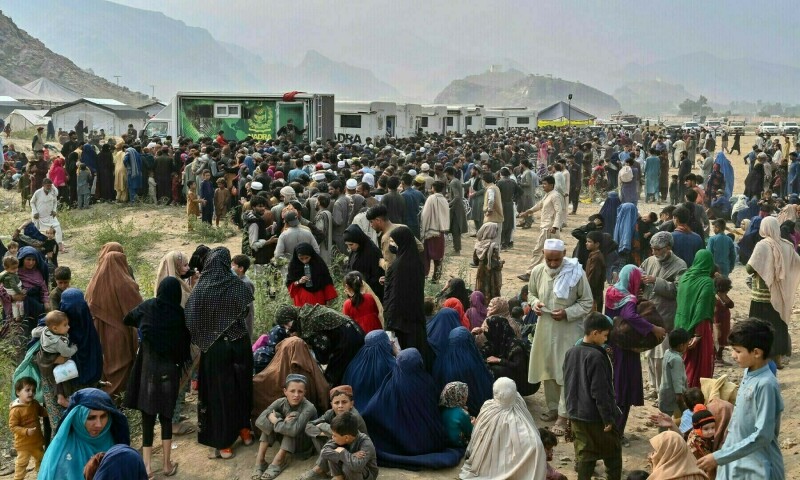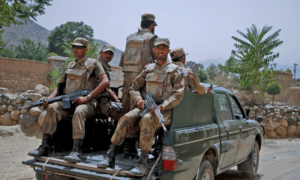ISLAMABAD: With the Constitutional Bench set to resume the hearing of a petition against the mass deportation of Afghans on Tuesday (today), the federal government has assured the Supreme Court that validity of the PoR cards issued to the registered refugees had been extended until June 30.
The public interest petition, to be heard by a seven-judge bench headed by Justice Aminuddin Khan, was filed by a coalition of civil society activists comprising rights campaigners former senators Farhatullah Babar and Mushtaq Ahmad, missing persons’ supporter Amna Masood Janjua and lawyers Jibran Nasir, Imaan Mazari and Imran Shafiq through Advocate Umer Ijaz Gilani. The petition was filed in the wake of a mass deportations decision announced by the Apex Committee on Oct 3, 2023.
In its report, the federal government assured the Supreme Court that all Afghan refugees who have been living in Pakistan following their registration in any form, including holders of PoRs or Afghan Citizen Cards (ACCs), will be provided full legal protection and will not be apprehended or deported.
This promise extends till June 30, 2025, as per the July 22, 2024 notification issued by the Ministry of States and Frontier Regions. The total number of PoR and ACC holders living in Pakistan is estimated to be 1.3 million and 700,000, respectively.
Report states 784,954 illegal foreigners have been repatriated so far
The report, filed by Additional Secretary Interior Nazar Muhammad Bozdar, stated that until now a total of 784,954 illegal foreigners, including Afghans, had been repatriated.
The report explains that since the roll-out of phase-I of the Illegal Foreigners Repatriation Plan (IFRP), a majority of illegal foreigners, including Afghan nationals, have been repatriated. However, the foreigners, who have been registered, were not being apprehended and deported.
The government pleaded that the petition may be dismissed as being not maintainable, frivolous, baseless, contrary to law and in the best interest of justice.
In November 2023, the petitioners had approached the SC seeking a stay against the IFRP launched by then-caretaker prime minister Anwarul Haq Kakar.
The principal argument of the petitioners was that not only was the mass expulsion a violation of Pakistan’s domestic and international human rights commitments, it was also beyond the scope of a caretaker government’s limited powers under the constitutional scheme.
The petition had sought a direction requiring the federal government not to detain, forcefully deport or harass anyone who was born in Pakistan and thus has a claim to birthright citizenship in accordance with Section 4 of the Citizenship Act, 1951 and the ruling of the Islamabad High Court in the 2021 Hafiz Hamdullah Saboor case.
The petition had contended that the government should also be asked to allow the UNHCR and its partner organisations to register and expeditiously process and decide all the asylum-seeking applications filed by foreigners residing in Pakistan.
The court should also order the federal government to coordinate with all relevant federal and provincial law enforcement agencies to secure the fundamental rights of all persons who were for the time being in Pakistan, the petition said.
It alleged that the government policy had failed to provide any mechanism that could distinguish between the birthright citizens and illegal immigrants. Thus, it violates the ruling in the Hafiz Hamdullah Saboor case.
The petition contended that the policy of deporting the refugees was in violation of the principles incorporated in Article 2A of the Constitution. Besides, the policy also failed to take into account the fact that many of the persons being deported or made liable to deportation may be doubly marginalised on account of factors like ethnicity, religion, gender etc.
The petitioner vehemently disagreed with the government’s view that all foreigners living in Pakistan, who do not have a valid visa, were liable to be deported. This simplistic view about “illegal immigrants” fails to take into account the fact that many of these so-called “illegal” and “undocumented” refugees were actually born in this country and had a solid claim to birthright citizenship. That they have remained without documents is because the government is simply not willing to issue them documents, despite the law and court judgements in their favour, the petition argued.
Published in Dawn, January 7th, 2025







